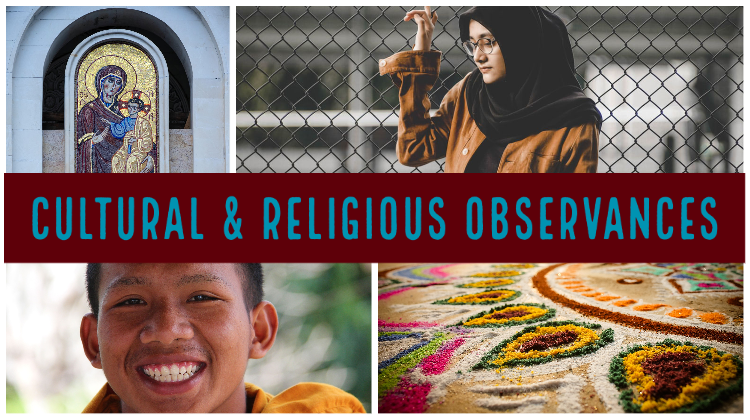Memorial Day
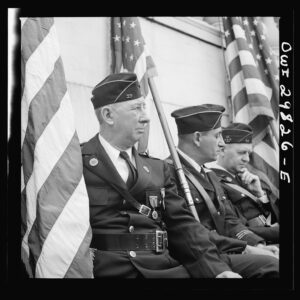
Culture/religion: National observance
Date: May 30
Three years after the Civil War ended, on May 5, 1868, the head of an organization of Union veterans — the Grand Army of the Republic (GAR) — established Decoration Day as a time for the nation to decorate the graves of the war dead with flowers. Maj. Gen. John A. Logan declared that Decoration Day should be observed on May 30. It is believed that date was chosen because flowers would be in bloom all over the country.
The first large observance was held that year at Arlington National Cemetery, across the Potomac River from Washington, D.C.
The ceremonies centered around the mourning-draped veranda of the Arlington mansion, once the home of Gen. Robert E. Lee. Various Washington officials, including Gen. and Mrs. Ulysses S. Grant, presided over the ceremonies. After speeches, children from the Soldiers’ and Sailors’ Orphan Home and members of the GAR made their way through the cemetery, strewing flowers on both Union and Confederate graves, reciting prayers and singing hymns.
Sources:
U.S. Department of Veterans Affairs
LGBTQ+ Pride Month

Culture/religion: National observance
Date: June
LGBTQ Pride Month is celebrated annually in the month of June to honor the 1969 Stonewall riots in New York City.
In June 1969, patron and supporters of the Stonewall Inn staged an uprising to resist police harassment and persecution of members of the LGBTQ community. This was the beginning of a movement to change discriminatory laws and practices against the LGBTQ community.
Celebrations include parades, concerts and workshops held around the world.
Sources:
LGBTQ Pride Month and Education Resources, Anti-Defamation League
Dragon Boat Festival
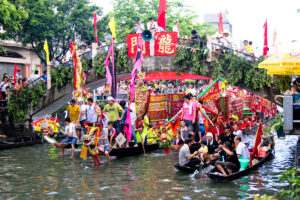
Culture/religion: Chinese heritage
Date: June 3
The Dragon Boat Festival is a public holiday in China that has a several stories of origination. The most common one today is that the Dragon Boat Festival is a holiday commemorating the death of the patriotic poet Qu Yuan. It is said that Qu Yuan drowned himself on the fifth day of the fifth lunar month to protest government injustice and corruption.
People who admired Qu Yuan raced out in their boats to save him; thereby becoming a tradition and the most popular activity during the festival.
Sources:
7 Facts to Learn Chinese Dragon Boat Festival, China Highlights
Dragon Boat Festival, Wikipedia
Pentecost
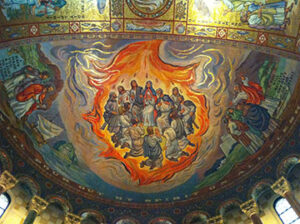
Culture/religion: Christianity
Date: June 5
Always occurring 50 days after the death and resurrection of Jesus and ten days after his ascension into heaven, Christians observe Pentecost to remember when the Holy Spirit descended on the apostles, causing them to speak in tongues.
Pentecost is considered to be the birthday of the Church, as it is when Peter, the first Pope, preaches for the first time and converts thousands of new believers.
Pentecost is celebrated in various ways around the world – wearing red vestments as a symbol of the burning fire of God’s love and the tongues of fire that descended on the apostles; white vestments worn in Britain and Ireland for “WhitSunday” or “White Sunday” as a symbol of the dove of the Holy Spirit; the Italian tradition of scattering rose leaves from the ceiling of the churches to recall the miracle of the fiery tongues, Pentecost sometimes being called Pascha Rosatum (Easter roses); blowing trumpets during Mass in France to recall the sound of the driving wind of the Holy Spirit; reciting long poems and prayers during an extra service in Asia; and carrying flowers or green branches during services in Russia.
Pentecost shares roots with the Jewish holiday of Shavuot which is the celebration of the beginning of the early weeks of the wheat harvest.
Sources:
Everything you need to know about Pentecost, Catholic News Agency
Pentecost is this Sunday. What the heck is Pentecost?, PBS.org
Shavuot
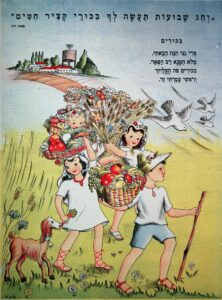
Culture/religion: Judaism
Date: June 5-6
Shavuot is a two-day holiday celebrating the completion of the seven-week Omer counting period between Passover and Shavuot.
The Torah was given by God to the Jewish people on Shavuot, and every year on the holiday the acceptance of God’s gift is renewed.
In observance of Shavuot, candles are lit on the first and second evening of the holiday; it is customary to stay up all night learning Torah on the first night; people go to the synagogue on the first day to hear a reading of the Ten Commandments; special meals are eaten and no work may be performed.
Shavuot begins at sundown June 4. No work permitted.
Alternate spelling: Shavu’ot
Pronunciation: shuh-VOO-oht / shah-VOO-uhs
Sources:
What is Shavuot (Shavuos)?, Chabad.org
Glossary of Jewish Terminology, Judaism 101, jewfaq.org

